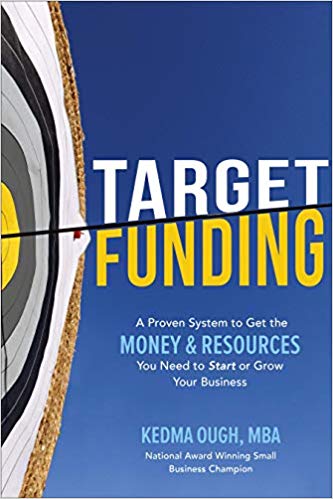Kedma Ough is one of today’s most respected authorities on business funding and entrepreneurship. She is a nationally renowned business coach and funding expert, adviser to independent inventors, winner of the Small Business Administration (SBA) Small Business Champion of the Year Award. She has guided thousands of entrepreneurs to a wide range of funding opportunities, and has shown thousands more how to fund their ventures through her target funding strategies. Today we will talk with her about some of the funding obstacles and opportunities.
Q. Welcome to StartUp Mindset, Kedma. We’re very excited to have you here. For the readers who are not familiar with you, could you tell us a little about yourself and your background?
I am a fifth generation entrepreneur and have consulted more than 10,000 businesses over the last 20 years. In that timeframe I have worked to improve the business factors for women, minorities, veterans, persons with disabilities and inventors. A few years ago I was dubbed the “Small Business Superhero” as I have advocated for others that often have difficulty getting through the system. I believe every entrepreneur has the opportunity to be successful if given the right resources, educational support and mentoring.
Q. You have recently published an interesting book entitled Target Funding: A Proven System to Get the Money and Resources You Need to Start or Grow Your Business. Could you tell us a little more about the book and why you decided to write it?
Target Funding provides a proven strategy to identify specific grants and resources for any business concept. The premise behind the book is that each entrepreneur and business has unique variables that can be targeted for specific funds and resources. In addition, our team curated more than 300 available grants and resources in the book so that readers can immediately review a chapter and take action.
In 2001, I had the misfortune of filing bankruptcy after leaving a difficult relationship. Quickly I realized that the opportunity for funding was nearly impossible. A few weeks after filing bankruptcy I received a credit card from Capital One for $200. It was that small credit card that sparked my 15-year journey to uncover grants and resources for entrepreneurs that may not be in an ideal financial situation to obtain a business loan, yet still strive for the American Dream.
I wrote the book for anyone that has struggled to finance their dream. I truly believe that dreams needs to stop ending up in the cemetery. Educating others on how to target funds levels the playing field. While it’s still hard work to execute on any business concept, one can never win if they don’t have the proper tools to win at the funding game.
Q. In your book, there was an interesting stat you mentioned. You wrote that big banks reject about 75 percent and small banks reject about 50 percent of small business loan applications. Yet 48% of small business owners seek outside financing from banks first. With such a low approval rate, why do you think entrepreneurs keep looking to banks for help?
Great question. First of all let me share that I respect banks and their position in the market. Banks have spent centuries building their brand as the first option for small business owners. In other words they have an incredible marketing strategy as an industry. Yet in reality there are inherent flaws with that branding. The first misconception is that most small business owners presume that a small business is defined as ten employees or less. In reality the definition of a small business according to the Small Business Administration is 500 employees or less so small business owners are competing in a much larger pool of lending applicants.
The second misconception is that the bank is willing to meet the entrepreneur at the same risk level and that is simply untrue. The lenders job is to secure their loans against collateral and mitigate all risk if possible. The most important take away is to know when to apply for a loan for your business. Banks certainly fund many small businesses but often not at the early stage of business development. Often I prefer to identify grants in the first few years whenever possible and then consider lending at a later stage of the business.
Q. You also listed some of the barriers that prevent entrepreneurs from getting a bank loan. Could you share a few of those with us?
There are several reasons but I will address four of them.
One of the issues is the time in business. Often lenders prefer to see companies in business two years or longer so they can get a solid review of their financials and predict their future financial preference. The second is the owner’s credit score. Lenders will make an assumption on your credit worthiness based on your past ability to pay your bills. Yet the reality is that many times that may be a false correlation. In my particular situation, I have always been credit prudent and the reason I had to file bankruptcy was due to a crisis and not because I didn’t know how to manage my money.
The third is the small business owner’s ability to put down a down payment against a proposed loan. Often the down payment may be twenty percent or more of the loan amount and many entrepreneurs have difficulty accessing the down payment. The fourth is collateral. Banks almost always require collateral be secured for any business loans. This is designed in the event that the business owner defaults on the loan and the bank has to collect on the debt. Many small businesses do not own enough assets to provide as collateral for a loan. In fact, women business owners especially have struggled with this specific challenge.
Q. Many entrepreneurs also look to angel investors or VC firms to help raise capital. You mentioned that this may not be the right approach for many small business owners. Could you tell us a few reasons why that is?
There are many reasons that entrepreneurs may find it difficult to obtain funding from angel investors or VC firms. One of the challenges is that investors are looking at companies that can scale rapidly and substantially in a large and diverse national or global market. The reality is not all businesses fit into this specific target market variable.
The second concern is that investors are looking at a high return on their investment. Many businesses may not be able to meet the return on investment requirements in the proposed time frame. Most investors are considering a 25% annual return on their investment not to mention a percentage of equity. Often it’s not feasible for a business to reach those margins.
The third concern is that the venture capital game is focused on specific target niches for investment. Many of the venture capitalists invest in technology and technology-enabled companies. Rarely do investors step outside their areas of specialization, and a large percentage of small businesses simply do not fit the target niche criteria.
Lastly investors don’t look solely at the progress and potential of an emerging business; they also look at the character and capabilities of team. They want a strong, cohesive, and fully engaged team that has the ability to overcome challenges and pivot when necessary. With a broad focus towards product development, financial management, marketing, and technology, many small businesses founders don’t have the correct team in place.
Q. I think your book is great because you offer a ton of funding opportunities that many people may be eligible for based on their demographic, geographic location, size of business, stage of business, etc. With so many funding options available, why do you think many entrepreneurs have a hard time funding their businesses outside the traditional methods?
Excellent Question. It really comes down to having a target funding calendar and executing on the application process. Most entrepreneurs don’t have a set path. The book breaks down a specific path to identifying funds for their business concept. Yet the difficult part of any business is taking the time to execute. Sometimes entrepreneurs want an immediate reward and with certain grants and resources it may take time to apply. The goal is to focus on short-term as well as long-term awards. For example, in 2008 I purchased my own office space and it took a while to go through the due diligence. In the end, I secured a 2,000 square foot office valued at $800,000 for only six percent down and my interest has been fixed for the last decade at .04 percent.
Q. What mindset or trait do you think every entrepreneur must possess in order to become successful?
The mindset is to be focused, disciplined and patient. Many of my close friends know my adoration for turtles. In the fable of the hare and the turtle, the turtle was slow and paced itself and in the end won the race. Target Funding is not a sprint. It’s a marathon. Staying focused on the marathon allows you to play the game differently. In the end, every entrepreneur puts their heart and soul into their dream and they deserve to see it come to fruition.










